BECOMING GUIDE TO







The first point of contact for those of you considering a career at the Bar is one of the four historic Inns of Court. This has been true for entrants to the Bar for over 600 years.
Anybody who wishes to be Called to the Bar of England and Wales must join one of the four Inns of Court.
The four Inns of Court have distinct histories, coming into being around the middle of the 14th century. The Inns held sole responsibility for legal education and therefore acted as gatekeepers to the profession. While much of this responsibility has been devolved to higher education institutions, the Inns continue to play an essential part in education and training for the Bar.
The Inns of Court also continue to hold exclusive rights of admission to the Bar. This process, known as ‘Call to the Bar’ or ‘Call’, occurs after you have successfully completed the academic and professional training components. This includes a programme of professional development activities at your Inn known as ‘Qualifying Sessions’.

1160
First recorded history of land called the Temple when it was acquired by the Knights of the Temple of Solomon of Jerusalem (Knights Templar).

1312
The order of Knights Templar abolished and their property seized on the orders of Pope Clement V for alleged malpractice.

1381
First record of lawyers occupying the Temple when Wat Tyler’s followers destroyed their lodgings and burned their records.
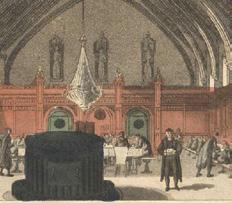
1505
The earliest surviving register of Inner Temple admissions.

However, Call does not entitle you to practise as a barrister as you must first complete a year of pupillage – a form of work based learning – and hold a practising certificate.
Students wishing to train for the Bar may choose which Inn to join, but can only apply to one Inn for scholarships.

1608
James I grants the Temple to the Benchers of the Inner and Middle Temple. The grant is of the whole Temple site, including the Temple Church and other buildings, and is made to the Benchers of each of the two Inns by name.

The Inns provide a great deal of valuable financial assistance for the various stages of becoming a barrister (see ‘Financial Assistance’ on p20–21).
Each Inn has three standard groups of members: students, barristers and Masters of the Bench, or ‘Benchers’. Masters of the Bench form the governing body of the Inn and new Benchers are chosen from existing members in addition to honorary members, such as

1919
Membership of the Inns opened to women.
1922
Ivy Williams, the first female barrister, called to the Bar by the Inner Temple.
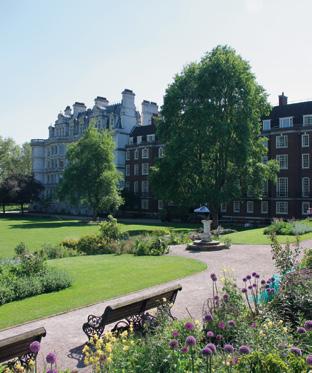
legal academics and usually at least one member of the Royal Family.
The senior Bencher of the Inn is the Treasurer, a position held for one year. The Under or Sub-Treasurer is the acting chief executive of the Inn. The General Council of the Bar (‘Bar Council’) and the Bar Standards Board provide other representation and regulatory functions for the profession.
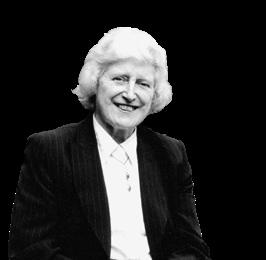
1988

2008
The Rt Hon Baroness ButlerSloss, first woman to be appointed to the Court of Appeal. She was also the first female Treasurer of the Inn, in 1998.
400-year anniversary of the Inn’s first Royal Charter.

The Library has been in existence since the sixteenth century and combines a traditional law library with services required by a 21st century barrister.
The Library is housed on the second floor of the Treasury Building and is open to all members of the Inns of Court.
It is a legal reference Library, staffed by experienced information professionals, which offers users access to a range of print and electronic resources in a comfortable working environment.
The Library supports the Inn’s members throughout their careers. Students are offered qualifying sessions on basic and advanced legal research. Pupils receive inductions on Library services and legal research training to assist them during pupillage. A series of database training sessions help practising barristers to keep up to date with developments in online research.
There is a bookable Reading Room for small group discussions or for participation in webinars. A phone booth provides space for users to make phone calls.
The Library offers an inclusive and accessible space with authoritative resources in an environment that is conducive to study and wellbeing. More information on the Library’s collections, services and contact details can be viewed at innertemplelibrary.org.uk
Work has now completed on Project Pegasus, a vital development and refurbishment of the Inn’s main (Treasury) Building and Hall. Project Pegasus has created an attractive, flexible space with state-of-the-art facilities for the delivery of education and training programmes for students, pupils and practitioners to support the activities of the Bar for generations to come.
The revitalisation of Inner Temple will secure the long-term future of the Inn, ensuring members and other people who use the Inn have the services and facilities to support a vibrant legal profession. You can find out more about the Inn’s refurbishment at innertemple.org.uk/ project-pegasus

The Inner Temple’s historic grounds, which include six Grade I listed buildings, are in the heart of the legal district in London, close to the Royal Courts of Justice and St Paul’s Cathedral. Our extensive estate is predominantly rented out to barristers’ chambers.
The Inn benefits from three acres of beautiful gardens. The Inner Temple Garden is usually open daily between 12.30pm and 3pm throughout the year.
On the north side of our Hall is one of the most historic churches in London. Founded by the legendary Knights Templar, the Church was consecrated in 1185 and has stood throughout the Crusades, the founding of the Anglican Church and the World Wars. In addition to being renowned for church music, it is also a site for contemporary legal debates. During the 400th Anniversary celebrations, an important series on Islam and English Law was held in the church.
A fundamental feature of the Inner Temple is its focus on education and training, from student to established practitioner. The dedicated Education and Training Department is responsible for the training of student members of the Inn, alongside the approved education and training organisations that provide the vocational qualification component, advocacy training for pupils and new practitioners as well as the provision of continuing professional development (CPD) courses.
For student members, the Inn organises many educational Qualifying Sessions including residential weekend courses, staffed and directed by its senior members, lecture nights and various vocational workshops. All of these enable students to qualify for Call to the Bar. With regular opportunities to meet and learn from members of the judiciary and the practising Bar, the Inn has a reputation for its approachability and friendliness. We are committed to helping you through the early stages of your journey to the Bar.
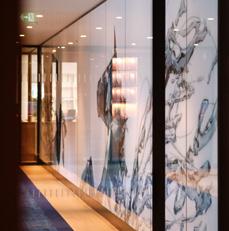
When do I have to join an Inn?
You can join an Inn of Court if:
You are studying or have completed a qualifying law degree
You are currently studying or have been accepted onto a law conversion course
You have been exempted from or have successfully completed the academic stage of training
Depending on the pathway to qualification you are following, you will have a specific point at which you need to join an Inn of Court. This is a requirement of the Bar Standards Board.
Please note that you can only apply to join one Inn. The admission fees vary across the Inns. For more information on the Inner Temple’s membership fee please visit the website listed at the end of this section.

The Department is also responsible for awarding scholarships for the law conversion course, vocational qualification component, disability grants and internships. The Inn has a strong commitment to supporting promising students from all walks of life and to giving financial assistance where appropriate to ensure that the cost of becoming a barrister is not a barrier.

How?
You can make your application to the Inn via our online portal, accessed via innertemple.org.uk/join
The Treasury Office is happy to give prospective students advice on completing their application.
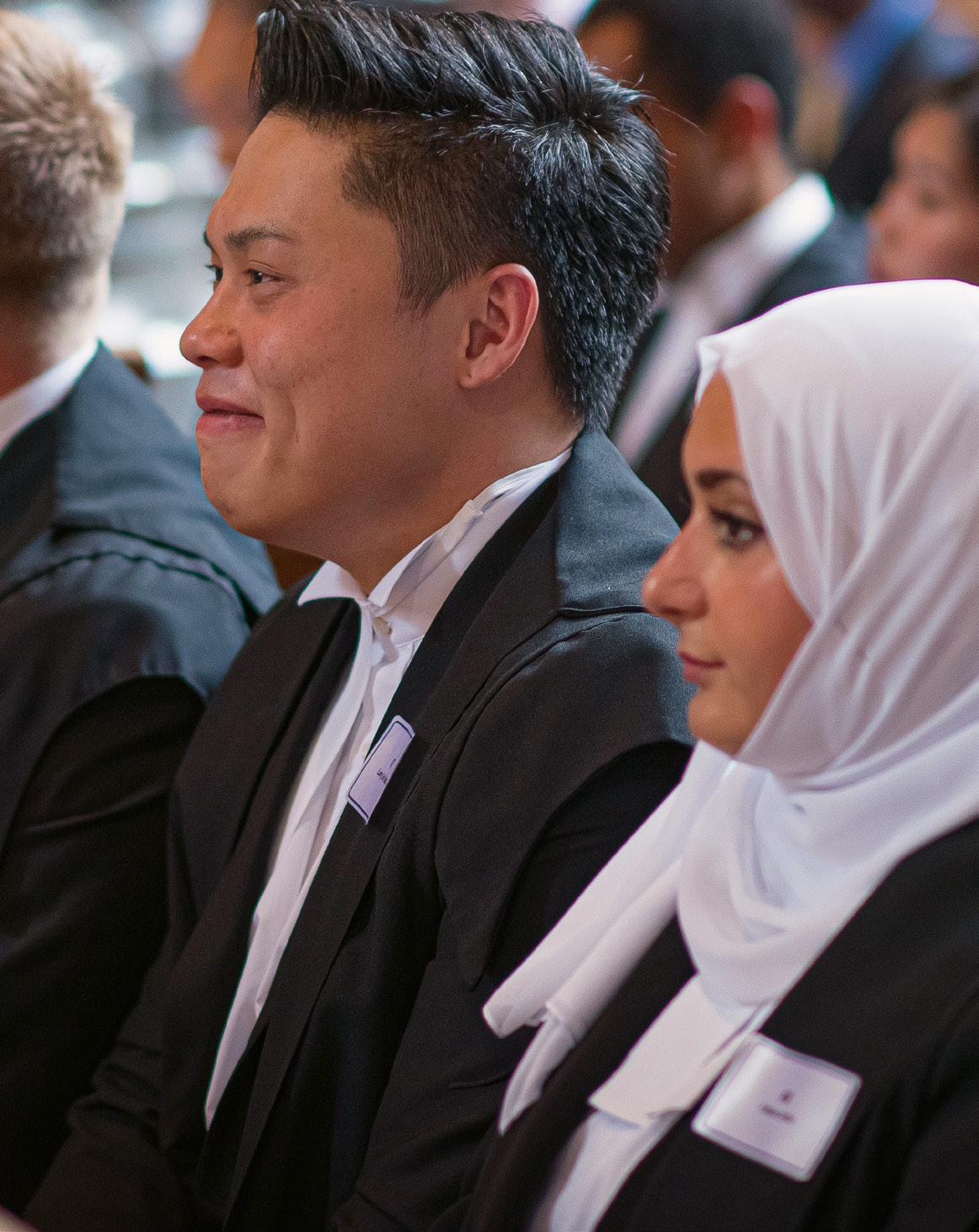
There are many experiences, in addition to your education, which will help you on your journey to the Bar. Any experience, whether a part-time job, previous career, voluntary role, observing in your local court, or mini-pupillage, can be valuable as long as you can articulate what you have learned and gained from the experience.
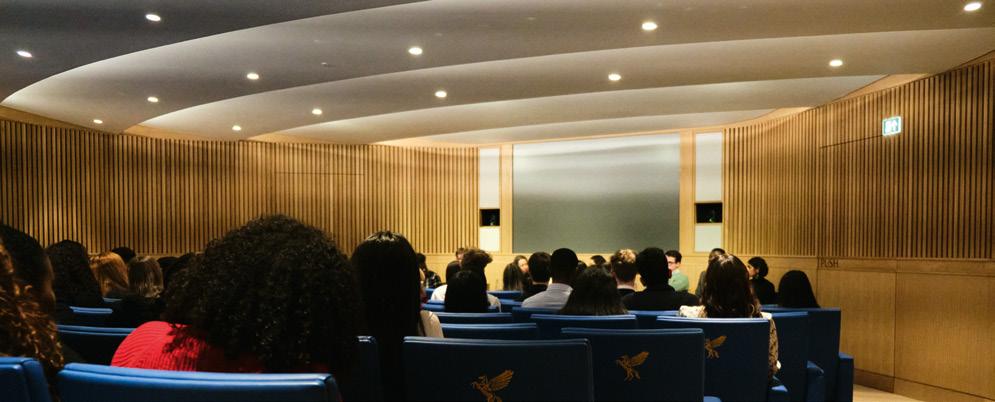
Overleaf you will see the different educational qualifications required to become a barrister; in all cases this requires an undergraduate degree. Whilst an undergraduate law degree remains the leading entry qualification into the Bar, the number of people undertaking a law conversion course and then progressing to a career at the Bar is increasing. In a report published by The Bar Council, just under 40% of those who were offered pupillage in the 2022/23 application round had completed a non-law undergraduate degree and subsequently completed the law conversion course.
High academic merit remains the leading factor in progression to pupillage with 96% of people who obtained pupillage in 2022/23 doing so with a 2:1 or above. Obtaining a First will increase your chances of obtaining pupillage.
It is important to be confident that you will have a realistic prospect of obtaining pupillage before starting the Bar Course. More and more people are taking some time between finishing their law degree and the Bar Course to gain valuable life and work experience.


Before committing yourself to a career at the Bar, it is helpful to get an idea of what the profession entails on a dayto-day basis. One of the ways of doing this is by undertaking work experience in chambers. Formal placements are known as ‘mini-pupillages’. These are short placements, normally between two and five days in duration, that will allow you to shadow one or more barristers. Activities might range from reading and discussing case papers to attending conferences or court proceedings.
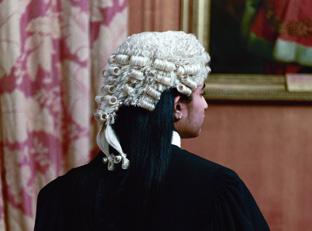
Undertaking a range of mini-pupillages in various sets of chambers will also expose you to different practice areas, helping you to decide which areas you might want to specialise in. It is recommended that you see a variety of chambers – both in London and on Circuit. Undertaking at least one ‘mini’ is almost essential for Inns of Court Bar Course scholarships, and subsequent pupillage applications in particular, as they demonstrate your dedication to a career at the Bar. You should seriously consider undertaking at least three mini-pupillages before beginning the pupillage application processes. Be sure to take notes during and after the experience, so that when it comes to writing applications for scholarships or pupillage you can refer to these experiences and demonstrate how these experiences have prepared you for a life at the Bar.
Some chambers require applicants to undertake a mini-pupillage at their set of chambers in order to be eligible to apply to them for pupillage. If this is the case, be mindful of deadlines so that you do not miss out on doing a mini-pupillage at that particular set of chambers.
Visit the mini-pupillage hub at chambersstudent.co.uk/the-bar/ mini-pupillage-vacancies to find out which chambers offer mini-pupillages. From there, you will be able to visit the websites of the chambers which interest you to find out their application process.

Aside from mini-pupillages, there are many other types of work experience (paid or unpaid) that can be valuable. Work experience in solicitors’ firms can give you a wider view of the legal profession as a whole. Other useful forms of legal experience include volunteering with Citizens Advice or at a law centre, marshalling (shadowing a judge), or taking on cases via organisations like the Free Representation Unit and Advocate. If you decide to take a year out to strengthen your CV, you may be able to work as a paralegal, a judicial assistant or a research assistant.
Casual or part-time work, or a previous job/career, should also be mentioned on applications as it can show development of relevant skills which are highly valued by selection panels. Volunteering and positions of responsibility can be relevant to your future career as a barrister.
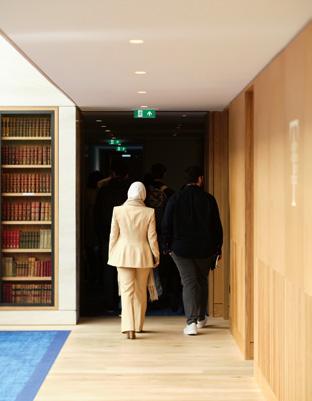

What do the pathways cover?
All the pathways cover the three components of education and training for the Bar.
The three components are: academic component (degree); vocational component (formerly the Bar Professional Training Course); pupillage/work-based learning.
To become a barrister, you will have to follow one of three different pathways:
Three-Step pathway:
Academic component, followed by vocational component, followed by pupillage/work-based learning.
Students complete an academic degree which could be either a law degree or a non-law degree. Students on a non-law degree will need to complete a Graduate Diploma in Law.
After the academic component is completed, students must join an Inn of Court and meet the English Language Requirements.
Once you have completed these requirements, you can start a vocational component course which is normally 9 months long. This vocational component will include BSB centralised assessments on subjects such as Civil Litigation, Criminal Litigation, Evidence and Sentencing. It will also include skills training on subjects including Advocacy, Option Writing and Legal Research and Professional Ethics.
You will be assessed on these skills subjects by the organisation running the vocational component.
You must also complete Qualifying Sessions with your Inn.
A number of organisations can offer the vocational component combined with an LLM.
Once you have completed the vocational component course, the Qualifying Sessions and undergone the necessary criminal record checks, you will be eligible to be Called to the Bar. You will also have to have completed pupillage/work-based learning before being able to be authorised as a practising barrister.

Academic component, followed by vocational component in two parts, followed by pupillage/ work-based components.
Students complete an academic degree which could be either a law degree or a non-law degree. Students on a non-law degree will need to complete a Graduate Diploma in Law.
After the academic component is completed, you’ll need to meet the English Language Requirements.
Once you have completed these requirements, you can start a vocational component course which under this pathway will be in two parts.
Part 1 would consist of the knowledge-based parts of the course – civil and criminal litigation and evidence, which are centrally examined by the BSB. Candidates would be able to prepare for Part 1 either independently or on a formal course.
Only those who pass Part 1 would then be able to proceed to Part 2 which will consist of the remaining skills-based elements. You must then join an Inn of Court before starting part 2.
Once you have completed part 2, completed the Qualifying Sessions and undergone the necessary criminal record checks, you will be eligible to be Called to the Bar. You will also have to complete pupillage/work-based learning before being authorised as a practising barrister.
Students must be admitted to one of the Inns of Court which continue to be responsible for the fitness to practise test and for Calling students to the Bar. Students will be required to complete Qualifying Sessions at their Inn of Court before being Called to the Bar.
Combined academic and vocational components followed by pupillage/work-based component.
Under this pathway you will be able to combine the academic and vocational components together normally as part of a degree or a degree followed by a Masters year.
You will need to join an Inn of Court before you start the vocational component and so it is worth checking with the organisations running the course when this will be.
You will still need to complete Qualifying Sessions and meet the English Language requirement. You will have to complete assessments run by the organisations and the BSB centralised assessments.
Once you have completed this integrated part of the pathway and undergone the necessary criminal record checks, you will be eligible to be called to the Bar. You will also have to complete pupillage/work-based learning before being authorised as a practising barrister.
They are also required to undergo a Criminal Record Check and, if necessary, the equivalent international checks in advance of the ceremony.


Call to the Bar is not only your ‘graduation’ upon completion of the academic and professional qualification components, it is also an important stepping stone to your career. The Legal Services Act 2007 defines a barrister as “an individual who (a) has been called to the Bar by an Inn of Court, and (b) is not disbarred by order of an Inn of Court”. Call is the conferral of the ‘Degree of the Utter Bar’ and the title ‘Barrister’. The degree is conferred on those who have completed the required academic, vocational and Inn’s qualifying session stages of qualification, and who have satisfied the Inn that they are fit and proper to be called to the Bar.
Inner Temple hold four Call ceremonies each year:
Hilary (March)
Trinity (July)
Deferred Trinity (October)
Michaelmas (November)
The ceremony itself is normally held in the historic setting of the Temple Church, built in the 12th Century by the Knights Templar. While the organ plays, students process down the aisle shortly followed by the Masters of the Bench. During the ceremony, students are called to the Bar by one of the Masters of the Bench with the Treasurer awarding students their certificates in front of guests. Afterwards, there is a drinks reception and a chance for students and their guests to celebrate. The Hilary Call has a similar structure, however the ceremony is conducted in the Hall.
While being Called gives you the title ‘barrister’, you cannot practise as a barrister until you have obtained pupillage. Pupillage typically lasts one year and is divided into two parts –a non-practising period and a practising period – usually of six months each. You receive money for undertaking pupillage, and this is called a pupillage award. The minimum award for 2024 is £23,078 per annum for pupillages in London and £21,060 per annum for pupillages outside London. Many pupillage awards are at a higher level than the minimum.
Obtaining pupillage is one of the most competitive parts of becoming a barrister. All pupillages are now advertised centrally on the Pupillage Gateway and are regulated by the Bar Standards Board. Except in exceptional cases, you have five years after completing the Bar Course to start pupillage. Many will not obtain pupillage on their first attempt, which is why it is important to be resilient when attempting to obtain pupillage and gain additional experience wherever possible.
We always aim for Call to the Bar to be a joyous occasion for students, and their families and friends, to set them off properly on their journey to becoming a barrister.
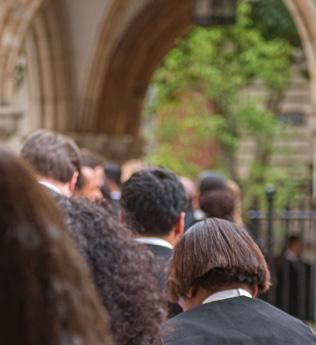
More in-depth information about pupillage can be found by searching for The Bar Qualification Manual, produced and kept up to date by the Bar Standards Board.

There are two main contexts in which barristers practise: the self-employed Bar, where barristers are based in chambers, and the employed Bar, where barristers work as part of an organisation. The former is more well-known and makes up a large percentage of barristers, while the latter is steadily growing.
Approximately 80% of barristers are selfemployed, taking control of all aspects of their work, such as the areas in which they practise and their working hours. For example, you may finish in court early, choose to take the afternoon off to run errands, and then continue working in the evening. However, this level of freedom may not be best suited to those who prefer a more structured approach and one of the key skills of a selfemployed barrister is time management. Being a self-employed barrister means you are paid for the cases and work you take on, which also means that if you are not doing the work, you will not get paid. The culture of chambers and the ability to tap into the knowledge, experience, and expertise of senior members of chambers is another benefit of self-employment.
Changes to legal aid in recent years mean that some of those practising in the areas most affected have been attracted to the relative certainty of life at the employed Bar. The comfort of a guaranteed salary is an undeniable attraction for many.
For those who opt to go to the employed Bar, there are a range of opportunities to practise within a larger organisation. Some places where you may find employed barristers are:
Government Legal Service
Crown Prosecution Service
Armed Forces
Law firms
Large, usually multinational, businesses
Regulatory bodies
Many at the employed Bar talk of the more beneficial work-life balance they can have, because they are unlikely to be given work at the last minute for a hearing taking place the next day. Additional features such as parental leave, sick pay, annual leave and pensions have also drawn people to the employed Bar, although chambers do also have regulatory obligations in relation to parental leave. As there are likely to be fewer other barristers around you in these organisations, the ability to draw on expertise from more senior practitioners is not as simple as in chambers.
While most barristers are self-employed, this doesn’t mean that there is a better or worse way of working: your preferred environment will depend very much on your working style and, crucially, this may change over time. Many people may start off at the self-employed Bar and move to the employed Bar, and vice versa.


First known as the Schools Project and more recently the Discovery Days, the Inn has a long-standing tradition of inviting state schools to bring Year 12 and Year 13 students to the Inn for a taste of a career at the Bar. We are very proud to be working in partnership with the Sutton Trust Pathways to Law Programme, offering each participant on the programme the opportunity to attend a Discovery Day. This two-year programme aims to offer information and guidance to young people considering a career in law, in addition to helping them develop the skills and confidence necessary to pursue it.
On a Discovery Day, students receive advice and guidance about pursuing a career at the Bar and participants are given the chance to hear from a panel of barristers and to take part in a plea in mitigation and legal exercise workshop. The activities are designed to help young people gain an understanding of what being a barrister involves, the types of skills involved and importantly, whether it might be a suitable career for themselves.
For more information about the Pathways to Law programme, and how to apply please visit suttontrust.com/our-programmes/ pathways-to-law
In 2021, the Inn was delighted to launch a new suite of digital resources for school students aged between 14-16, their parents/carers and their teachers in partnership with the Open University. These resources are interactive, enabling students to learn about what a barrister does on a day-to-day basis, different practice areas at the Bar, the role of the Inns of Court and the academic requirements of the role. You can find out more and access these resources by following these links:
Learning about barristers: https://bit.ly/3G04Aqj
Support an aspiring barrister: https://bit.ly/31dtm7K
If you would like a barrister to give a talk to your school students, please contact the Bar Council: careers@barcouncil.org.uk regarding the ‘Speak Up for Others’ Scheme.
The Inner Temple hosts a series of events around England and Wales that aim to give an insight into the profession. Hear from practising barristers and judges about their path to the bar and join us for a networking reception afterwards, where you can interact with barristers, judges and staff from the Education and Training department.
Insight Events are an opportunity for university students, graduates and career changers to ask questions and learn more about their prospective careers.
View upcoming Insight events and book here: innertemple.org.uk/insight
If you are an aspiring barrister, we would encourage you to arrange a tour of Inner Temple. The most suitable point to do this is when you are considering which Inn to apply to for a scholarship or which Inn to join, so usually in the second year of your LLB or before starting the law conversion course. A member of our outreach team will show you round our lovely building and talk through any questions you might have about the process of becoming a barrister.
If you would like to arrange a tour, please visit innertemple.org.uk/tours for guidance on how to do this.


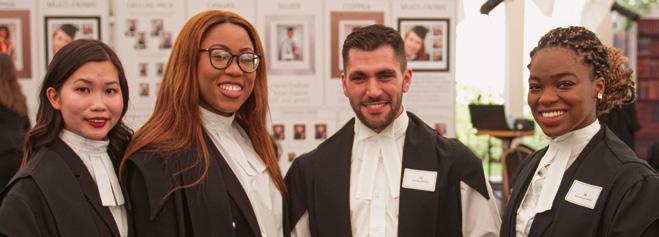
PASS is a leading programme designed to support aspiring barristers who have not yet started the Bar Course.
PASS was established in 2012 by the Inner Temple and 62 different partner chambers across a range of practice areas. The scheme continues to run with a wide range of partner chambers.
Our aim is to improve access to the profession and to support high achieving students from under-represented backgrounds by providing experiences and developing skills that will support a career at the Bar.
For participants who have been unable to secure many minipupillages at the point of application the PASS programme team will arrange a placement and cover reasonable associated travel costs (and accommodation costs, where needed). Participants who have already secured two mini-pupillages at the point of application will not be eligible for a placement.
In addition, PASS supports participants by providing a focused professional and advocacy skills development programme via a mix of in-person and online delivery.
To be eligible for PASS you must:
Have attended state school for the majority of both your secondary and sixth form education (ages 11–18) AND
Be on course for (or have achieved) at least a 2:1 in your undergraduate degree or, where a classification lower than a 2:1 was achieved, demonstrated academic ability at a higher level of study or in the workplace.
You must also meet at least one of the following criteria:
First generation of your family to access higher education
Recipient of Free School Meals at any point
In the care of the Local Authority at any point in your schooling. This is often referred to as being ‘care experienced’.
Estranged at the time of university study
When you were aged 14, the main household earner worked in one of the following professions:
Technical and craft occupations (eg. motor mechanic, plumber, printer, electrician, gardener, train driver)

Routine, semi-routine manual and service occupations (e.g. postal worker, machine operative, security guard, caretaker, farm worker, catering assistant, sales assistant, HGV driver, cleaner, porter, packer, labourer, waiter or waitress, bar staff)
OR
Were long-term unemployed OR
You are in receipt of income or housing benefits (eg. job seeker’s allowance, PIP. Student finance is not included in this)
We welcome applications from mature applicants and applicants with disabilities. Applicants must be 18 years of age or older.
Participation in one of the below partner programmes is also considered as part of the application:
Inner Temple Schools Project (Discovery Days)
Sutton Trust: Pathways to Law
Applications for PASS usually open late Spring. Find out more at: innertemple.org.uk/pass
We asked two of our PASS scholars to provide a few words about their experience on the programme in 2023/24.

Finn
PASS has been an invaluable stepping stone in my journey to the Bar. Principally, the Dinner to the Universities provided a unique opportunity to network with fellow aspiring barristers and established practitioners. This included a KC who, over a delightful meal, shared honest insights into balancing family life with a demanding legal career.

Another highlight of the scheme was a one-on-one video call with HHJ Caroline Wigin, a Judicial Governing Bencher of the Inner Temple. Her feedback on my CV was not only encouraging, but she also provided concrete suggestions for how I could reframe weaker areas. Additionally, Judge Wigin offered invaluable advice on steps I could take to further develop myself in preparation for future pupillage applications, which has given me a clearer path forward.
The virtual skills sessions, focusing on advocacy and interview techniques, were instrumental in my preparation for the Inner Temple’s Bar Course scholarship interview. I am thrilled to have since been awarded a Major Scholarship and firmly believe that PASS played a crucial role in my success. I look forward to building upon this foundation as I make my first pupillage applications next year.

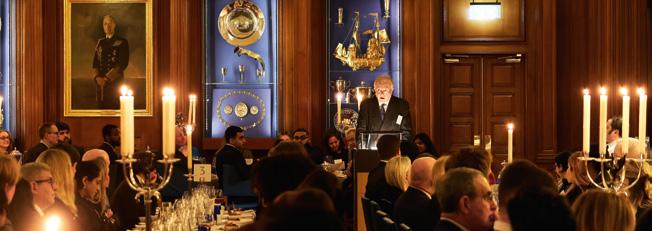

I was told about the PASS programme by a friend who was preparing for the Bar Course, and she shared how the programme not only honed her skills but also solidified her decision to apply for a Bar Course Scholarship at Inner Temple. Inspired by her positive feedback, I applied to be part of the 2023/2024 intake and was delighted to be selected from around 200 applicants as one of the 60 participants.
From my very first visit to Inner Temple, I felt an immediate sense of belonging. This institution is not just about tradition; it’s actively dedicated to fostering diversity and inclusivity within the bar. My journey to the Bar has been unconventional—I transitioned into law post-pandemic, coming from a very different career, which is far from the ‘typical’ Bar candidate profile. Inner Temple’s supportive environment has made this transition smoother and more welcoming, showing me that my aspirations of becoming a barrister are not just dreams, but achievable goals.
The PASS sessions have been incredibly enriching, enhancing my advocacy skills and providing valuable networking opportunities at events like Dinner to the Universities. These experiences are crucial in a profession where connections and skill go hand in hand.
Additionally, receiving the COMBAR Scholarship through the PASS programme has been transformative. It granted me access to mentorship from a barrister at a leading commercial chambers and a mini pupillage with a commercial set that is both competitive and highly rewarding.
These opportunities have significantly strengthened my future applications and deepened my understanding of a career at the bar.
I am also grateful that the PASS programme helped me to obtain a Bar Course Scholarship with Inner Temple and I can now start my Bar studies in September 2024.
To anyone contemplating a future at the Bar, I wholeheartedly recommend applying for the PASS programme. The combination of workshops, mentorship, and real-world experience it offers can truly enhance your prospects of securing a pupillage and successfully entering the legal profession.
To anyone contemplating a future at the Bar, I wholeheartedly recommend applying for the PASS programme. The combination of workshops, mentorship, and real-world experience it offers can truly enhance your prospects of securing a pupillage and successfully entering the legal profession.

The Inner Temple is proud to be able to offer financial support to our student members as they embark on a career at the Bar. We are fortunate to be able to do this through the income generated by the Inn and from funds provided by the generosity of our members, past and present, and benefactors.
For 2025 the Inner Temple intends to offer over £2,000,000 in awards across the different scholarships programmes.
[Being awarded a scholarship] represents a huge vote of confidence in my abilities and propensity to become a successful advocate. The scholarship has removed the financial barriers in going to the Bar, making my entry to the profession, as someone from a non-traditional background, possible.”
Elizabeth Shanks, 2024 Bar Course Scholar
The Inner Temple has a variety of scholarships available during the different stages of your journey to the Bar:
Available to those who are completing a law conversion course.
Available to those who are going on to start the Vocational Component of their Bar Course Training.
Available to members with a disability who are completing a Bar Course or currently undertaking pupillage.
Available to members undertaking the Bar Course and those in practice.
Available to members who are on minimally funded pupillages to help top up Chambers’ pupillage grants.
Available to members of all four Inns in their first seven years of practice.
Scholarship Type Open for applications Deadline When should you apply? How do I apply?
GDL Scholarship Award
The Spring before your law conversion course starts Online application form Bar Course Scholarship Award
Internship Awards
The Autumn before you start the Bar Course Online application form
After you have received a decision from DSA
Download application form from website
From the Spring of starting your Bar Course Online application form Pupillage Awards
From the April before your pupillage starts or during your pupillage Online application form Pegasus Scholarship Trust Awards
Within the first seven years after completing pupillage Online application form
We advise you to check the Inner Temple website for the exact application dates for each programme.
In order to apply for a scholarship, you will be required to submit an online application form, which you can access via the Inner Temple website when the application portal is open. The application form is broken down into 6 sections:
1 Contact information
2 Educational details
3 Legal and non-legal work experience
4 Supporting information
5 References
6 Equality monitoring
7 Contextual recruitment information
The ‘supporting information’ section includes professional statement/essay style questions, which are specific to the scholarship you are applying for. Please note that if you submit an application, you will be asked to provide details on your financial circumstances in the January after you submitted your form, via a separate form within the scholarships portal.
Applicants are required to arrange for two references to be included in support of a scholarship application, which can be either academic or professional references. All referees should have known the applicant for at least 6 months, and references should be as detailed as possible. Please note that family members cannot provide references. As part of the application form, applicants will be required to provide the names and contact details for their referees. An automatic email, with guidelines, will then be sent to the referees, asking them to submit their reference to us via an online form.
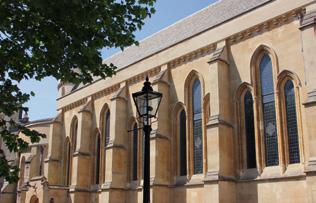

Prior to applying, I had the opportunity to ask various questions about the scholarship and the process through an open event, which was incredibly helpful.
Fidel Bonnah, 2024 Bar Course Scholar

The Inn aims to interview all candidates that apply for a scholarship. Candidates’ application form and interview performance is assessed against the below scholarship criteria, which is used for all Inner Temple Awards. The Inner Temple awards its funds based on merit: that is, the Scholarship Committee’s assessment of the evidence put before them, regarding the applicant’s potential to succeed at the Bar of England and Wales.
The criteria are listed below. For more information about how each is assessed please visit our website.
1 Academic Achievement
2 Advocacy Potential
3 Legal Analysis and Reasoning (Bar Course Scholarships only)
4 Interpersonal Skills
5 Motivation
Apart from the Named Top Awards (see page 24), all other scholarship awards consider the financial need of candidates when determining the sum to be awarded. This is determined by assessing the resources available, the needs that each candidate is likely to have during the specific period of their professional journey, and to see where each candidate fits in the spectrum of candidates.
The criteria for financial need are:
1 Capital/debt (existing and prospective)
2 Income (existing and prospective, from all sources – including any other likely award or provision, e.g. from a public body, prospective pupillage chambers, charity or parents)
3 Personal expenditure (existing and prospective, including fees)
4 Exceptional considerations (e.g. dependants, or special liabilities) We recommend that all applicants complete the financial statement. While it is not compulsory, if it is not completed, any award received (other than the named awards mentioned above) would be made at the minimum level.

The diversity of the interview panel made for particularly engaging conversation, and I felt that I was able to provide an authentic overview of the well-rounded person I am. I walked out of the interview with confidence that even if I did not receive the scholarship, I had mostly certainly made the right decision to become a barrister.
Irmak Akcebe, 2024 Bar Course Scholar
In 2025 the Inner Temple will have over £2,000,000 available to award for the Bar Course and GDL. For more information as to how this is broken down please see our website: innertemple.org.uk/scholarships.
GDL Scholarships
Scholarships available:
GDL Scholarships – breakdown of awards:
Princess Royal Scholarship 2
Major Scholarship 4
These are awarded to candidates who receive the highest scores on their GDL scholarship application and are a fixed amount. For more information on amounts please visit our website.
These are the second-tier awards and the amount awarded are means-tested.
Exhibition Scholarships Approximately 30 These awards are means-tested
Bar Course Scholarships
Scholarships available:
Top awards (Peter Taylor Scholarship, Stephen Chapman Scholarship, Princess Royal Scholarships
These are awarded the candidates who receive the highest scores on their Bar Course Scholarship application and are a fixed amount. For more information on amounts please visit our website.
These are the second-tier awards and the amount are means-tested.
Exhibition Scholarships Approximately 93 These awards are means-tested Benefactors’ Scholarships and Prizes 18
These are awarded in conduction with the exhibition awards and do not affect the final means-tested amount awarded. Duke of Edinburgh Entrance Scholarships 50 These cover admission and Call fees.


Up to £15,000 is available annually to assist student and pupil members of Inner Temple who have a disability. The scheme aims to support a parity of educational experience for members who disabilities, by covering some of the associated additional costs they may have. This may include but is not limited to: learning support helper; specialist equipment (for example specific software); extra travel costs incurred because of a disability; other disability-related costs of studying. Please note that Inner Temple Disability Awards will not be able to cover costs which any other student/pupil may have, or costs which are not associated with your course/ pupillage. GDL and Bar Course students may also be eligible to apply for Disabled Students’ Allowance (DSA). Where eligible, applicants are encouraged to apply for DSA in the first instance.
The Inner Temple offer a small number of scholarships for those with a minimally funded pupillage, called Benefactors’ Scholarships. The Marshall Hall Trust will also provide an additional amount to be divided between successful applicants in the form of Marshall Hall Trust Pupillage Awards.
The Pegasus Scholarship Trust was founded in 1987 by the Rt. Hon Lord Goff of Chievely, as a Charitable Trust supported by all four Inns. The Trust’s aim is to make it possible for ‘gifted young lawyers – the future leaders of their professions – to learn about the practical working of the common law system in countries other than their own.’ The scheme is open to members of all four Inns who are in their first 7 years of practice (after pupillage).
Inner Temple makes a small number of awards each year to help members undertake internship placements that will widen their experience of the world outside the Bar and enhance the skills they can bring to their practice. Although almost any project can be considered, preference is given to international placements with a legal element which include unpaid/low paid work for the community. A trust set up in memory of Sir Joseph Priestley also makes a generous annual contribution to these awards.

Student Members must complete 10 Qualifying Sessions in order to be Called to the Bar. Students must attend a minimum of 1 session under each of the themes listed below and at least 2 sessions must be interactive and require preparation in advance.
The Inn’s Qualifying Sessions are spread across five themes as follows:
Ethics, Standards and Values
Advocacy Skills
Legal Knowledge, Justice and the Rule of Law
Equality, Diversity and Inclusion
Preparation for Pupillage, Career Development and Wellbeing

Every Inn has a different Qualifying Sessions programme, so that provision may affect your decision as to which Inn is best suited to your needs.
The Inner Temple runs a varied programme. Our sessions take place in person and online depending on the content and are held during evenings and weekends. Unlike other Inns, we have no minimum requirement for the number of Qualifying Sessions you must attend in person, although we do encourage our members to attend some in person events if possible, in order to benefit from the opportunity to network.

The department run Introductory Events at the Inn to allow students some time to get to know the Inn, its members and relevant organisations around the Bar. This includes Specialist Bar Associations, Student Societies, future employers and organisations supporting Equality, Diversity and Inclusion at the Bar. Separate Introductory Events are run for students based in London and outside of London, to ensure that attendees receive the most useful personalised information.

These sessions can take place both online and in person and will include students hearing from practitioners at all stages of their legal careers, discussing varied topics including aspects of pupillage, EDI concerns, life at the Bar, wellbeing and more. These sessions are intended to supplement the advocacy, legal research, ethics and legal knowledge training and to give students a more holistic view of life and work in the legal profession.
The legal research training is led by librarians from the Inner Temple. It covers the basics of legal research and provides an essential refresher for students starting the Bar course. More advanced training is offered over the course of the year.
Taught by external professionals, skilled in public speaking and vocal projection, these sessions give students the opportunity to develop their presentational skills, posture and performance, all as a means of improving their oral advocacy.
The Inn hosts three student advocacy weekends a year, at external conference centres. The weekends offer students the opportunity to hear from high profile speakers and experts in the topic under discussion, as well as the chance to practise their advocacy skills.

These Qualifying Sessions are tailored to students studying at providers outside of London, at urban centres around the country. In previous years, students have attended sessions on ethics, pupillage applications, EDI and ADR.
The Inn contributes to cutting edge legal debates through its Reader’s Lecture Night and Social Context of the Law series.
Experienced practitioners will take students through advocacy exercises, ethics questions or similar in a supportive and informal environment. Students will be encouraged to engage in small groups or anonymous interactive voting and online discussions. These sessions give students the opportunity to hone their skills and develop their knowledge in a relaxed and unassessed session.

Read more about our Qualifying Sessions at innertemple.org.uk/ education
The following schemes are designed to help our students enhance their experience and learning. These schemes are for Bar Course students or those who have been Called but not yet obtained pupillage.

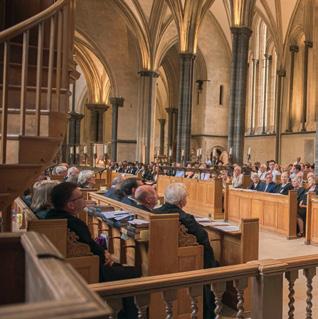

Mentoring Scheme
This is a scheme that pairs students with experienced practising barristers who can give advice and impartial assistance.
My mentor was absolutely fantastic and gave me some excellent insight that proved useful in pupillage applications.
Marshalling Scheme
This scheme gives students the opportunity to spend up to a week with a High Court or Circuit Judge either in London or on Circuit.
The judge shows students the case papers and discusses the proceedings. The experience provides a valuable opportunity to observe the workings of the court from an entirely different perspective. This scheme is open to students in the second half of their bar course.
Interview Scheme
This scheme aims to help students develop their interview skills in preparation for imminent pupillage interviews. Students are given the opportunity to practise their interview technique and to build up confidence in front of barristers.
The marshalling scheme has given me a privileged insight into a judge’s reality. I cannot recommend the experience highly enough.
The mock interview was extremely useful and provided very helpful and encouraging feedback.
The Inner Temple has four active student societies. They each organise a number of events throughout the year.

ITSA is open to all students undertaking the Bar course and those who have completed it in the past 5 years, but still seeking pupillage. The Association promotes collegiality, provides a welcome break from studies, and offers several opportunities to build your CV. An essay competition, criminal mock trial and pupillage application events are just a few to note.

The Racial Equality Society is open to student members who self-identify as being from a Black, Asian or minority ethnic background. The aim of the society is to facilitate access to the Bar for those from ethnic minority backgrounds and to create a support network for students from backgrounds with the least representation in the profession.

The Society is beneficial to students in many ways: confidence, clarity and projection being just three skills that can help to improve your advocacy.
Annual pantomimes have starred actors and actresses from all walks of legal life, including practising barristers and readings from Senior Benchers. Student members have previously written, directed and performed at the Edinburgh Fringe Festival. The Society also take part in an annual competition called The Temple Shakespeare Cup (also known as ‘The Shake Off’) against neighbouring Inn, Middle Temple.
The Association promotes collegiality between students and provides a welcome break from studies.

Playing an active part in the Inner Temple Debating Society holds numerous benefits. Teams compete regularly across the UK and host countless opportunities for you to practice your skills in person. This includes competitions such as the Rawlinson Cup Debate and Inner Temple Debating Shield. The Society can help you build your confidence and advocacy skills from the comfort of your own home with a series of online training sessions. If you want to get involved as an undergraduate before joining the Inn you can take part in the annual Intervarsity Debating Competition, where they host the top competitors on the debating circuit.

What is mooting? Moots are legal problems in the form of fictitious cases. Appearing before the Bench are two teams of two counsel – a senior and junior counsel on each. Counsel will routinely be asked several questions by the judge(s) relating to their submissions. Of course, winning the moot is not the same as winning the argument. It really is a case of how you play the game rather than whether you win or lose.
Inner Temple mooters compete in some of the world’s most prestigious mooting competitions, for example, the Willem C Vis International Commercial Arbitration Law Moot, Telders International Law Moot Competition, and International Criminal Court Moot, among others. In recent years, the Inner Temple has sent mooters all over the UK and as far as Washington, DC. Mooting provides a fantastic opportunity to see places and meet people from all over the world. The society also hosts an Intervarsity competition.

The Inner Temple runs an extensive programme of advocacy training for pupils, new practitioners and established practitioners alike. Anyone joining the Inner Temple can look forward to outstanding training from committed trainers. The Inn is fortunate to have a hugely dedicated membership, both barristers and judges, who are willing to give up countless hours in the evenings and over weekends to assist with the training.
To obtain a practising certificate, pupils must successfully complete an ‘Advocacy Training Course’ within their nonpracticing period, which is usually the first six months of pupillage.
The Inn runs two advocacy courses. Course A takes place during October and November, and Course B takes place during January and February.
The Inner Temple’s Advocacy Training Course is taught by judges, Masters of the Bench and barristers of all levels, who are accredited advocacy trainers for the Inn.
As part of the Inn’s Pupil Training Programme, we also deliver a noncompulsory ‘Practice Management Course’ which takes place in January each year.
For more information please visit: innertemple.org.uk/education
An independent report by the Advocacy Training Council (now known as the Inns of Court College of Advocacy), which monitors advocacy training in England and Wales, stated that “…those in charge of advocacy training at Inner Temple are among the most experienced advocacy trainers at the Bar. The use of the Handbooks for Pupils/New Practitioners and Trainers is eloquent testimony to the enormous amount of time, thought and care which goes into the preparation of advocacy training at Inner Temple…”
After a barrister has completed pupillage and gained tenancy, either in self-employed practice or at the Employed Bar, they will become a ‘new practitioner’.
In their first three years of practice, ‘new practitioners’ are required to complete 45 hours of Continuing Professional Development (CPD) including at least nine hours of advocacy training and three hours of ethics training.
The Inn’s New Practitioners’ Advocacy Course takes place twice each year in April and June, and provides the highest possible standard of training for barristers in their first three years of tenancy. The course comprises an intensive training residential weekend and at the core of the weekend is a case allowing ‘new practitioners’ to gain experience in handling expert witnesses played by accountants and medical doctors.
Our New Practitioners’ Ethics Course comprises of self-directed learning, a live specialist session and self-assessment. The course provides ‘new practitioners’ with the opportunity to discuss a range of ethical questions and issues under the guidance of established practitioners.
The Inner Temple Handbook mentioned in the report has become the foundation for a handbook now approved for use here and abroad by the Inns of Court College of Advocacy.
On completion of the New Practitioners’ Programme, all practising barristers, whether employed or self-employed, are required to undertake continuing professional development (CPD) each year in order to keep their skills and knowledge up to date.
The Inn’s new programme of educational activities for established practitioners includes a wide range of sessions which can be counted towards their CPD requirement. Sessions so far have been held both in person and online, and have included talks, panel discussions and practical workshops on topics such as dealing with distressing material at the bar, advanced crossexamination, communication skills, careers development, accounting and tax matters, as well as a flagship international conference on Open Source and User-Generated evidence.
There are also training opportunities for those wishing to become pupil supervisors or advocacy trainers for the Inn, and specialist Advocacy and the Vulnerable sessions for members who deal with vulnerable witnesses.
Education and Training Department
Treasury Building, Inner Temple, London EC4Y 7HL
020 7797 8208
education@innertemple.org.uk
/TheInnerTemple
/TheInnerTemple


Outreach Enquiries
outreach@ innertemple.org.uk
020 7797 8240
Scholarship Enquiries
scholarships@ innertemple.org.uk
020 7797 8211
Pegasus Trust Enquiries
pegasus@innertemple.org.uk
020 7797 8210
Pupil and New Practitioner Enquiries
pupils-practitioners@ innertemple.org.uk
020 7438 2310
Established Barrister Enquiries
establishedbarristers@ innertemple.org.uk 020 7797 8209
Pre-Pupillage Enquiries
pre-pupillage@ innertemple.org.uk
020 7438 2311
Qualifying Session Enquiries
qs@innertemple.org.uk
020 7438 2311
Call to the Bar Enquiries
call@innertemple.org.uk
020 7797 8257
Design: wearenoun.com Print: Harvest Communications Ltd

innertemple.org.uk / education